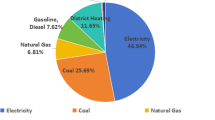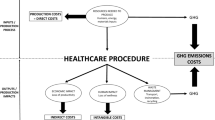Abstract
Climate change is a growing threat for human health and well-being, one that will seriously impact and potentially disrupt all economic sectors and supply chains, such as trade, tourism, agriculture, forestry, and fisheries. The environmental impact of the delivery of medical and hospital care, which generates its own greenhouse gas emissions, needs to be examined and analyzed in detail in order to design and implement effective mitigation actions and measures. Hospital internal energy use processes include the energy consumed for hospital operation, such as lighting, heating, cooking, waste treatment, and other functions associated with the logistical and operational support of hospitals. The present research work, which follows the assessment undertaken in a previous study of the transport activities of the 401 Military General Hospital of Athens (401 MGHA), focuses on the carbon footprint of the stationary emission sources of the 401 MGHA; it serves as a second step in the development of an action plan for the mitigation of greenhouse gas emissions in the hospital-based health care of the Hellenic (Greek) Army. A portfolio of energy saving and emission reduction actions is proposed and mapped according to their abatement cost and greenhouse gas (GHG) reduction potential. The highest decrease of GHG emissions is expected to be materialized by the decarbonization of the Greek power sector due to the lignite phase-out and increased share of low carbon fuels and renewable energy sources. Significant emission reduction potential could also be achieved by the replacement of face-to-face hospital visits by telemedicine, primarily by reducing transport-associated emissions. Furthermore, a number of key performance indicators (KPI) are proposed as simple and easily monitored metrics of the hospital’s performance towards its sustainable low carbon objectives. Specific KPIs per mitigation action are presented, as well as a general KPI that covers all mitigation actions and sources of emissions in the form of “tCO2eq per patient” or “tCO2eq per hospitalization day.”

Similar content being viewed by others
Data availability
All data generated or analyzed during this study are included in this published article.
References
Bakopoulou, S., et al. (2005). Medical waste management in Greece: The case of Thessaly region. Sustainable Development and Planning II, 1, 565, 571–573.
Bozoudis, V., & Sebos, I. (2021). The carbon footprint of transport activities of the 401 Military General Hospital of Athens. Environmental Modeling and Assessment, 26(2), 155–162. https://doi.org/10.1007/s10666-020-09701-1
Budd, K. (2019). Hospitals race to save patients — and the planet. [online]. https://www.aamc.org/news-insights/hospitals-race-save-patients-and-planet. Accessed 20 September 2021.
Dacones, I., Cave, C., Furie, G.L., Ogden, C. A., & Slutzman, J. E. (2021). Patient transport greenhouse gas emissions from outpatient care at an integrated health care system in the Northwestern United States, 2015–2020. The Journal of Climate Change and Health, 3, 100024. https://doi.org/10.1016/j.joclim.2021.100024
Eckelman, M., & Sherman, J. (2016). Environmental impacts of the U.S. health care system and effects on public health. PLoS One, 11(6). [online]. https://doi.org/10.1371/journal.pone.0157014. Accessed 20 September 2021.
Eckelman, M., Huang, K., Lagasse, R., Senay, E., Dubrow, R., & Sherman, J. D. (2020). Health care pollution and public health damage in the United States: An update. Health Affairs, 39(12), 2071–2079. https://doi.org/10.1377/hlthaff.2020.01247
European Environmental Agency. (2020). Country profiles — Greenhouse gases and energy. [online]. https://www.eea.europa.eu/themes/climate/trends-and-projections-in-europe/climate-and-energy-country-profiles/country-profiles-greenhouse-gases-and-1. Accessed 20 September 2021.
Gillingham, K., & Stock, J. H. (2018). The cost of reducing greenhouse gas emissions. [online]. https://pubs.aeaweb.org/pdfplus/https://doi.org/10.1257/jep.32.4.53 Journal of Economic Perspectives, 32(4), 53–72.
González-Sánchez, M., & Martín-Ortega, J. L. (2020). Greenhouse gas emissions growth in Europe: A comparative analysis of determinants. Sustainability, 12, 1012. https://doi.org/10.3390/su12031012
Health Care Without Harm, HCWH. (2019). Health care’s climate footprint. [online]. https://noharm-global.org/sites/default/files/documents-files/5961/HealthCaresClimateFootprint_092319.pdf. Accessed 20 September 2021.
Hellenic Republic, Ministry of Environment and Energy, MEEN. (2020). National Inventory Report (NIR) of Greece for Greenhouse and other Gases for the Years 1990–2018. 119, 417, 530–531.
Hellenic Republic, Ministry of the Environment and Energy, MEEN. (2019). The National Energy and Climate Plan (NECP). [online]. https://ec.europa.eu/info/energy-climate-change-environment/implementation-eu-countries/energy-and-climate-governance-and-reporting/national-energy-and-climate-plans_en. Accessed 20 September 2021.
Holmner, A., Ebi, K.L., Lazuardi, L., Nilsson, M. (2014). Carbon footprint of telemedicine solutions - Unexplored opportunity for reducing carbon emissions in the health sector. PLoS One, 9(9). [online]. https://doi.org/10.1371/journal.pone.0105040. Accessed 20 September 2021.
IPCC. (2006). Eggleston, H.S., Buendia, L., Miwa, K., Ngara, T., Tanabe, K. (Eds.). IPCC Guidelines for National Greenhouse Gas Inventories, Prepared by the National Greenhouse Gas Inventories Programme. Published: IGES, Japan.
IPCC. (2007). Forster, P., V. Ramaswamy, P. Artaxo, T. Berntsen, R. Betts, D.W. Fahey, J. Haywood, J. Lean, D.C. Lowe, G. Myhre, J. Nganga, R. Prinn, G. Raga, M. Schulz and R. Van Dorland, 2007: Changes in atmospheric constituents and in radiative forcing. In: Climate Change 2007: The Physical Science Basis. Contribution of Working Group I to the Fourth Assessment Report of the Intergovernmental Panel on Climate Change [Solomon, S., D. Qin, M. Manning, Z. Chen, M. Marquis, K.B. Averyt, M.Tignor and H.L. Miller (eds.)]. Cambridge University Press, Cambridge, United Kingdom and New York, NY, USA.
IPCC. (2021). The Physical Science Basis. Contribution of Working Group I to the Sixth Assessment Report of the Intergovernmental Panel on Climate Change [Masson-Delmotte, V., P. Zhai, A. Pirani, S.L. Connors, C. Péan, S. Berger, N. Caud, Y. Chen, L. Goldfarb, M.I. Gomis, M. Huang, K. Leitzell, E. Lonnoy, J.B.R. Matthews, T.K. Maycock, T. Waterfield, O. Yelekçi, R. Yu, and B. Zhou (eds.)]. Cambridge University Press. In Press.
IPCC. (2018). Global warming of 1.5 °C. An IPCC Special Report on the impacts of global warming of 1.5°C above pre-industrial levels and related global greenhouse gas emission pathways, in the context of strengthening the global response to the threat of climate change, sustainable development, and efforts to eradicate poverty [Masson-Delmotte, V., P. Zhai, H.-O. Pörtner, D. Roberts, J. Skea, P.R. Shukla, A. Pirani, W. Moufouma-Okia, C. Péan, R. Pidcock, S. Connors, J.B.R. Matthews, Y. Chen, X. Zhou, M.I. Gomis, E. Lonnoy, T. Maycock, M. Tignor, and T. Waterfield (eds.)].
Javadinejad, S., et al. (2021). The analysis of the most important climatic parameters affecting performance of crop variability in a changing climate. International Journal of Hydrology Science and Technology, 11(1). https://doi.org/10.1504/IJHST.2021.112651
Kallinikos, L., et al. (2016). Greenhouse gas emissions trends from waste in Greece. In: P. Grammelis (Ed), Energy, Transportation and Global Warming. Green Energy and Technology. Springer, Cham. https://doi.org/10.1007/978-3-319-30127-3_12
Karliner, J., et al. (2019). Health care’s climate footprint. 5, 8, 36. [online]. https://noharm-global.org/sites/default/files/documents-files/5961/HealthCaresClimateFootprint_090619.pdf. Accessed 20 September 2021.
MacNeill, A. J., et al. (2017). The impact of surgery on global climate: A carbon foot printing study of operating theatres in three health systems. The Lancet Planetary Health. Accessed 20 September 2021.
Milner, J., et al. (2020). Health benefits of policies to reduce carbon emissions. BMJ Clinical Research, 368, l6758. https://doi.org/10.1136/bmj.l6758
Müllerová, M., Krtková, E., & Rošková, Z. (2020). F-gases: Trends, applications and newly applied gases in the Czech Republic. Atmosphere, 11, 455. https://doi.org/10.3390/atmos11050455
NHS Midlands and Lancashire Commissioning Support Unit. (2018). The potential economic impact of virtual outpatient appointments in the West Midlands - A sco** study. [online]. www.strategyunitwm.nhs.uk/sites/default/files/2018-11/180813_Economic%20Impact%20of%20OP%20Appointments%20for%20WM%20CCGs_FINAL.pdf. Accessed 27 January 2021.
Ostad-Ali-Askari, et al. (2020). Effect of climate change on precipitation patterns in an arid region using GCM models: Case study of Isfahan-Borkhar Plain. Natural Hazards Review. ASCE-American Society Civil Engineering Publisher, 21(2). https://doi.org/10.1061/(ASCE)NH.1527-6996.0000367
Purohit, A., Smith, J., & Hibble, A. (2021). Does telemedicine reduce the carbon footprint of healthcare? A Systematic Review Future Healthcare Journal, 8(1), e85–e91. https://doi.org/10.7861/fhj.2020-0080
Sebos, I., et al. (2016). Mitigation and adaptation policies related to climate change in Greece. In: P. Grammelis (Eds) Energy, transportation and global warming. Green Energy and Technology (pp. 35–49). Springer, Cham. https://doi.org/10.1007/978-3-319-30127-3_4
Sebos, I., Progiou, A., & Kallinikos, L. (2020). Methodological framework for the quantification of GHG emission reductions from climate change mitigation actions. Strategic Planning for Energy and the Environment, 39(1–4), 219–242. https://doi.org/10.13052/spee1048-4236.391411
Sherman, J. D., MacNeill, A., & Thiel, C. (2019). Reducing pollution from the health care industry. Journal of the American Medical Association, 322(11), 1043–1044. https://doi.org/10.1001/jama.2019.10823
Stamopoulos, D., et al. (2021). Does investing in renewable energy sources contribute to growth? A preliminary study on Greece’s National Energy and Climate Plan. Energies, 14, 8537. https://doi.org/10.3390/en14248537
Talebmorad, H., et al. (2021). Evaluation of the impact of climate change on reference crop evapotranspiration in Hamedan-Bahar plain. International Journal of Hydrology Science and Technology., 11(3), 333–347. https://doi.org/10.1504/IJHST.2021.114554
United Nations Climate Change. (2015). The Paris Agreement. [online]. https://unfccc.int/process-and-meetings/the-paris-agreement/the-paris-agreement. Accessed 20 September 2021.
Vidal-Alaball, J., Franch-Parella, J., Lopez Seguí, F., Garcia Cuyàs, F., & Mendioroz Peña, J. (2019). Impact of a telemedicine program on the reduction in the emission of atmospheric pollutants and journeys by road. International Journal of Environmental Research Public Health, 8, 16(22), 4366. https://doi.org/10.3390/ijerph16224366
Whetten, J., Montoya, J., & Yonas, H. (2019). Access to better health and clear skies: Telemedicine and greenhouse gas reduction. Telemedicine Journal and E-Health, 25(10), 960–965. https://doi.org/10.1089/tmj.2018.0172
Author information
Authors and Affiliations
Corresponding author
Ethics declarations
Conflict of interest
The authors declare no competing interests.
Additional information
Publisher's Note
Springer Nature remains neutral with regard to jurisdictional claims in published maps and institutional affiliations.
Rights and permissions
About this article
Cite this article
Bozoudis, V., Sebos, I. & Tsakanikas, A. Action plan for the mitigation of greenhouse gas emissions in the hospital-based health care of the Hellenic Army. Environ Monit Assess 194, 221 (2022). https://doi.org/10.1007/s10661-022-09871-3
Received:
Accepted:
Published:
DOI: https://doi.org/10.1007/s10661-022-09871-3




